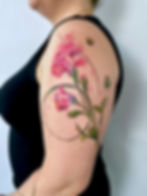Can Medications Affect Your Tattoo?
- Avant Art Tattoo
- Jun 23, 2025
- 4 min read
Updated: Dec 26, 2025
You’ve booked your tattoo appointment. You’re excited. But then you wonder:
“Can the medication I’m on affect the tattoo process or healing?”
Short answer? Yes, it absolutely can.
At Avant Art Tattoo Studio in Chippenham, we specialise in custom watercolour, abstract and fine line tattoos. These styles demand precision, delicate skinwork, and perfect healing, so it’s vital you understand how certain medications, supplements, and medical conditions could impact your tattoo experience.
This isn’t about scaring you. It’s about empowering you to get the best possible result, safely.

💊 Can Medication Affect the Tattoo Process?
Yes. Some medications (and even herbal supplements) can thin the blood, affect the skin’s sensitivity, or interfere with healing, which can all influence how your tattoo looks and how well it heals.
🧠 Here’s Why It Matters:
• Thinner blood = excess bleeding, which can push ink out of the skin
• Some drugs = delayed healing or higher risk of infection
• Skin-altering meds = increased sensitivity, bruising, or ink rejection
That’s why we always ask about medications during your consultation. It’s not being nosy, it’s professional care.

🚩 Most Common Medications That Affect Tattoos
Here’s a breakdown of the most common types of medication that raise concerns:
1. Blood Thinners
• Examples: Aspirin, Warfarin, Ibuprofen, Clopidogrel
• Effect: Causes excess bleeding during tattooing, dilutes ink, and can lead to blurred lines or patchy colour.
Tip: Never stop prescribed blood thinners without talking to your GP first. Always consult your doctor before booking your tattoo.
Depending on the reason you're taking the medication, it might not be wise to get tattooed, or it might require shorter sessions.
⸻
2. Accutane (Isotretinoin), Minomycin (or other Tetracycline related medication) or other prescribed drug for acne
• Used for: Severe acne
• Effect: Thins the skin and severely slows healing. Tattoos done while on Accutane can scar, reject ink, or heal poorly.
Wait at least 6–12 months after finishing a course before getting tattooed.
⸻
3. Steroids
• Examples: Prednisone, Hydrocortisone
• Effect: Can thin the skin, suppress immune response, and increase healing time.
Tattoos may not hold ink as well and are at higher risk for infection during healing.
⸻
4. Antibiotics
• Effect: May indicate your immune system is compromised or fighting infection. Not a good time to get tattooed.
Wait until your course is finished and you feel fully recovered.
⸻
5. Immunosuppressants
• Used for: Autoimmune conditions, organ transplants
• Effect: Healing is significantly slower. Risk of infection is higher. The tattoo may appear faded or patchy.
A letter from your GP may be needed, and extra care will be required during healing.
⸻
6. Diabetes Medications
• Effect: Diabetes can affect circulation and healing, especially on the legs and feet.
Always inform your artist and consult your doctor. Healing plans may need to be adjusted.
⸻
7. Herbal Supplements & Over-the-Counter Products
• Examples: Fish oil, Ginkgo biloba, Vitamin E, Turmeric
• Effect: Many natural supplements thin the blood or increase bruising. Surprising, right?
Stop at least 48 hours before your tattoo (if safe to do so). Check with your GP or pharmacist.

🗣️ When Should You Speak to Your Doctor?
👉 Always speak to your GP if:
• You’re on long-term medication
• You have a chronic illness or autoimmune disorder
• You’re on blood thinners or steroids
• You’re immunocompromised
• You’re pregnant or breastfeeding (tattooing is not recommended)
🎨 Tattoo Artist Concerns: What We Look Out For
At Avant Art Tattoo Studio, your safety and tattoo quality are everything.
Here’s what we’re thinking about when we ask about meds:
• Will you bleed excessively, making ink harder to retain?
• Will your skin reject the pigment or struggle to heal?
• Will a reaction delay healing or cause infection?
• Do we need to adjust placement due to circulation issues or medically sensitive skin?
We also want to make sure you’re getting a tattoo you’ll love for life, not one compromised by preventable issues.
✅ How to Prepare for Your Tattoo If You’re on Medication
1. Tell us everything up front – Don’t worry, it’s confidential.
2. Ask your GP – Especially for prescriptions like blood thinners, Accutane, or steroids.
3. Avoid alcohol & caffeine for 24–48 hours – These thin the blood too!
4. Hydrate well and eat before your session – Helps your body handle the stress.
5. Follow healing instructions to the letter – No shortcuts. It matters.

📍 Thinking About a Tattoo While Managing a Health Condition?
We’ve tattooed everyone from runners with asthma to nurses on antibiotics to clients healing from autoimmune flares. The key? Honest communication and smart planning.
At Avant Art Tattoo Studio in Chippenham, we create bespoke watercolour, abstract, fine line, and emotionally expressive tattoos that respect your body, your story, and your health.
Let’s create a piece that not only looks stunning, but heals beautifully, too.
🗓️ Book a Consultation
Not sure if your meds are a problem? Let’s talk.
📸 Follow us on Instagram @avant.art.tattoo for new designs and real client journeys
